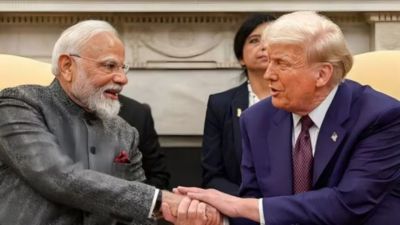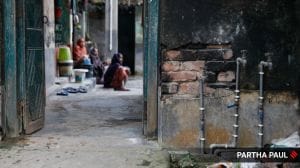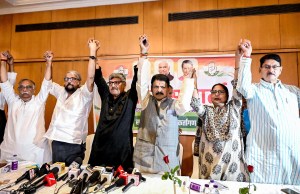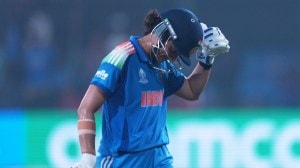Wicked Wicket Ways
On the evening of Thursday, February 12, the politics of politics overwhelmed the politics of cricket. By the evening of Friday, February 13...

On the evening of Thursday, February 12, the politics of politics overwhelmed the politics of cricket. By the evening of Friday, February 13, the business of cricket was threatening to overwhelm the politics of politics. From a non-starter, suddenly government sources were saying ‘‘the last has not been heard’’ on the Indian tour of Pakistan.
When the Union home ministry had ‘‘suggested’’ — using the sort of dictionary that defines sledging as conversation — that the Board of Control for Cricket in India (BCCI) defer the tour of Pakistan till after the Lok Sabha election, it had sent sub-continent’s cricket officialdom into a tizzy.
No, it wasn’t the future of Indo-Pakistani peace that particularly bothered the cricket overlords. What was at risk was carefully put together, patiently worked upon plan to revive bilateral cricket between two countries generally defined by conflict — by two cricket boards usually seen as co-conspirators.
True, whatever else happens the schedule of a warm up game between April 6 and 8, three Test matches beginning March 11 and five limited overs internationals between April 4-14 is unlikely to happen. A truncated tour is now being spoken about. The BCCI and its Pakistani counterpart would settle for anything — as long as a tour is allowed.
Why?
What precisely does this tour — or its deferment, idefinite or otherwise — mean for its principle stakeholders, the BCCI and the Pakistan Cricket Board? To the latter, cash-strapped as it is, it is the key to solvency; to the former, the problem is more immediate, and could come as early as March 11.
On that day the International Cricket Council (ICC) meets in New Zealand to, among other things, discuss England’s proposed cancellation of its Zimbabwe tour in November.
The England and Wales Cricket Board (ECB) says it has been advised by the British government to not go ahead with the tour. The ICC stand is short of an outright governmental ban or established security fears, a tour cannot be cancelled. Government ‘‘advice’’ is simply not good enough.
Zimbabwe is likely to demand compensation.
The Harare cricket officials expect strong backing from a close friend called Jagmohan Dalmiya, president of the BCCI. The third frame of this triptych is the PCB.
Supported by the PCB and allied cricket boards, Dalmiya — having anyway battled the Anglo-Australian authorities over the world cup payments issue — will play hard. Already some noises have been made about whether England can be trusted with hosting the lucrative ICC Champions Trophy — cricket’s biggest event outside the world cup. Some reports even talk of India as an alternative venue. The mind games have begun.
|
|
|
The Indian tour could earn the Pakistan board $20 million. In contrast the recent South African tour earned it just over $1 million. If the 2004 tour goes through, next year the Pakistanis will come to India. And the BCCI is already seeing dollar signs
|
|
|
The cosy BCCI-PCB arrangement — not to speak of the high moral ground against an England welshing on its commitments — sits uneasily with a postponement of the tour of Pakistan.
While clarity is not quite on offer, the home ministry has made it clear there is ‘‘no question of cancelling the tour’’. Nor has it questioned the security arrangements in Pakistan — it can hardly pre-empt the report of the recce team, expected back only Monday, February 16 . Indeed, BJP sources have pointed to elections in India being the logistical and emotional roadblock.
So is there any difference between the British government’s ‘‘advice’’ that the Zimbabwe tour be pushed into oblivion and the Indian government’s ‘‘suggestion’’ that the Pakistan tour be postponed?
More pertinently, will the BCCI and the PCB now be able to attack England jointly at the March meeting? Indeed, will the BCCI be able to attack England at all? Finally what sort of compensation will the BCCI have to pay? It is a matter it has already brought to the government’s notice.
The bountiful tourists
THE BCCI has been working on this tour since at least May 2003. That was when Board officials met key ministers and formally wrote a letter seeking permission for a tour of Pakistan in February-March 2004.
In reviving bilateral cricket, the BCCI was also trying to bail out the PCB, its best buddy in the divided house that is the ICC.
Since 9/11 Pakistan has been a pariah zone for international cricket. Australia and the West Indies refused to play there, even settling for neutral Sharjah as a series venue. New Zealand did go but quickly went home after a bomb exploded outside the team hotel in Karachi. More recently, South Africa completed an incident-free series.
Yet an India tour is where the big money lies. Two years ago, when the PCB signed a $ 42 million five-year television rights deal with Ten Sports, the 2004 India series was priced at $ 7 million for an estimated three Tests and three ODIs. The figure rose to $ 10 million when the ODIs went up to five.
As one Ten Sports executive put it, ‘‘It is fairer to say we saw the value of the tour at about $ 15 million. But we brought it down by spreading the money to other series.’’ Unsure of whether the 2004 India tour would take place, the PCB asked for higher guaranteed payments for other (non-India) tours in other years.
Aside from the $ 10 million for the television rights, the PCB has sold the title sponsorship for the series for $ 4 million, ancillary sponsorships for $ 2 million. If you add the gate money and local deals, you’re talking of a profit of $ 20 million.
In contrast, the recent South Africa-Pakistan series earned the PCB less than $ 2 million.
The triple whammy
THE 2004 series only opens an elaborate three-stage drama. Pakistan is committed to touring India in February-March 2005, playing the same number of matches India will play in Pakistan in 2004. If the current tour is derailed, the 2005 tour is obviously in jeopardy.
|
|
|
If the tour collapses, Dalmiya (left) can scarcely ally with the PCB and attack England for not going to Zimbabwe because of British government ‘advice’
|
|
|
Later this summer, the BCCI is to sell the television rights for cricket to be played in India, 2004-09. The previous five years fetched it roughly $ 50 million from Doordarshan. The next five could be ‘‘expected to bring in at least $ 75 million, at a conservative estimate’’, an insider says.
‘‘The Pakistan tour,’’ he adds, ‘‘will be the centrepiece of this five-year deal, worth about a quarter of it I guess.’’ Add to that the sponsorship and related revenue in India’s cricket-crazy economy. — the Pakistan tour of 2005, is ‘‘potentially worth $ 40-50 million to the BCCI’’.
Act III will come in 2006, when India goes to Pakistan for the third series in three years, a series for which television rights have already earned the PCB $ 12 million.
Lovely numbers — but none of them will happen in 2004 doesn’t happen. If India don’t go, Pakistan won’t come. More so, as a Union minister told Sunday Express, ‘‘An outright cancellation will send a very bad signal diplomatically.’’
So what can the solution be? Probably a shorter tour, maybe fewer ODIs than the five that were planned, all ending before the election campaign peaks in India. In short: bring the boys home by the first week of April.
It would be the perfect solution. The logic of the prime minister’s peace initiative would not be disturbed, the PCB-BCCI jugalbandi would not be interrupted — and the dollar signs in cricket’s eyes would shine stronger than ever.
In Pakistan, the garlands are ready
There is a buzz of excitement in Pakistan, great hope and enthusiasm. Advance planning and meticulous budgeting, travel schedules and hotel reservations, leave applications, even new clothese for the occasion — it’s all happening. Engagements and commitments are being put on hold till after March-April. The Indians are coming.
There is both disbelief and relief. Pakistan’s cricket fans have been looking forward to this for 15 years — since the Indian tour of 1989, Sachin Tendulkar’s first series. The grounds are getting a facelift, the lawns are being mowed, press facilities enhanced. Pakistan have already named a 22 member squad.
The cricket series is being viewed as the perfect icing on the cake of peace initiatives, after the resumption of flights, the reopening of train and bus services, the social and literary exchanges.
Just to recap, this will be the 13th series between the two countries. Forty-seven Test matches have been played. There have been minor cases of violence but except for 1984, when Indira Gandhi’s assassination came in the way of an Indian visit to Pakistan, no tour has been called off.
Pakistan has always toured India to fulfil obligations in spite of violence and threats — the slashing of Hanif Mohammad’s hand by a ‘‘fan’’ at a railway station, the digging up of the pitch at the Ferozeshah Kotla in Delhi by extremists, threats by the Shiv Sena, crowd violence in Kolkata, 1999, leading to the stadium being cleared of all spectators and the match being completed at an empty Eden Gardens.
|
|
|
Pakistan has always toured India to fulfil obligations in spite of violence and threats. The slashing of Hanif’s hand by a ‘fan’ at a rail station. The digging up of the Delhi pitch
|
|
|
NOW there are rumours and rumblings that the planned tour may not go through because of security fears. What security fears? When the guarantee has come from the highest authorities in Pakistan that the Indian team will be accorded VVIP protocol.
South Africa has just completed a successful tour. Visually-challenged cricket teams can come, delegations of actors and traders can cross the border — why can’t India’s best cricketers?
In this background to raise security issues is laughable. If the reasons are elections in India in April, let them take place; what does a cricket series with Pakistan have to do with elections in India?
Hopefully diehards on either side of the border will behave like sportsmen and give their blessings to the tour. Hopefully all this talk about the tour being scuttled is ‘‘media speculation’’ and once three-member Indian recee team has given its go ahead, the BCCI will select 16 merry men and put them on the flight to Pakistan.
No one in Pakistan would disrupt a cricket match; only cowards do that. So let us put all these imagined fears aside and get on with playing some cricket in right earnest. This is neither the time nor the place to go into all the riches that will come to the sponsors or the boards or the television rights holders. The first priority is the resumption of cricket ties between the two countries. If there is a policy decision it must be made frankly and boldy — not hidden behind the recce team’s report.
And don’t truncate the tour please. Karachi and Peshawar deserve their cricket. Just give it to them.





- 01
- 02
- 03
- 04
- 05


























